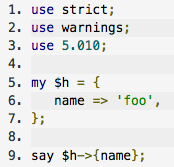Perl::Critic has many policies, but there are several additional modules that provide even more policies. For example the Perl-Critic-Nits distribution provides the ValuesAndExpressions::ProhibitAccessOfPrivateData policy that if violated would generate a message like this:
Private Member Data shouldn't be accessed directly at ...
Accessing an objects data directly breaks encapsulation and should be avoided. Example: $object->{ some_key }.
The policy tries to get us use
$obj->attribute;
instead of
$obj->{attribute};
Unfortunately the this generates a lot of false positive reports.
I think the most problematic part is that Perl::Critic, being a static analyzer, cannot know
if $h in a code snippet like this: $h->{name} is going to be a blessed object
or a plain hash reference. So the policy will report violations for plain hash references as well.
Another issue might be in classic OOP where at least the accessors will need to access the attributes as elements of a hash reference.
Example for plain hash reference
See this example:
examples/access_hash_ref_element.pl
use strict;
use warnings;
use 5.010;
my $h = {
name => 'foo',
};
say $h->{name};
If we run
perlcritic --single-policy ValuesAndExpressions::ProhibitAccessOfPrivateData access_hash_ref_element.pl
we get:
Private Member Data shouldn't be accessed directly at line 9, column 5.
Accessing an objects data directly breaks encapsulation and should be avoided. Example: $object->{ some_key }. (Severity: 5)
You can avoid the policy violation report by putting a comment on the line where you know it is ok to access the element of a hash reference:
say $h->{name}; ## no critic (ValuesAndExpressions::ProhibitAccessOfPrivateData)
Conclusion
If the code is primarily object oriented, especially if it is based on Moo or Moose, where you don't write your own accessors, then this policy can catch code that violates the encapsulation.
Screenshots

Comments
Sometime is use the following to filter out those messages. At leas when I want to concentrate on the other issues perlcritic finds.
perlcritic --exclude ValuesAndExpressions::ProhibitAccessOfPrivateData my_file.pm
Thanks for the write up Gabor.
